Behind every well-stocked liquor store lies a critical operation that ensures the shelves are brimming with the right bottles at the right time. This operation is alcohol inventory management, and it's the backbone of a smoothly running store.
But how do you ensure you always have enough of what your customers want, while avoiding shortages? That's where alcohol inventory best practices, tools, and tactics come into play. Tracking every bottle and sale and knowing when to reorder will keep your store running efficiently.
In this post, you’ll discover the tips and tricks you can use to get started on the right foot with alcohol inventory for your liquor store. We’ll also provide you with a list of the top inventory tools for liquor stores.

How To Do Alcohol Inventory: The Basics
Effective inventory management is a cornerstone of success for any liquor store. One primary benefit of strong alcohol inventory processes is that they help prevent overstocking and understocking, both of which can lead to financial pains.
Overstocking can result in holding costs or losses from spoilage, whereas understocking can cause missed sales and unhappy customers.
Additionally, robust inventory management helps liquor stores comply with alcohol laws and regulations, reducing their risk of fines and penalties. When you manage your inventory properly, you’re also able to optimize other parts of your store operations and customer experience — like loyalty programs, checkout processes, and more!
However, not all retail stores are the same regarding inventory management. Liquor stores face some unique challenges related to inventory, including:
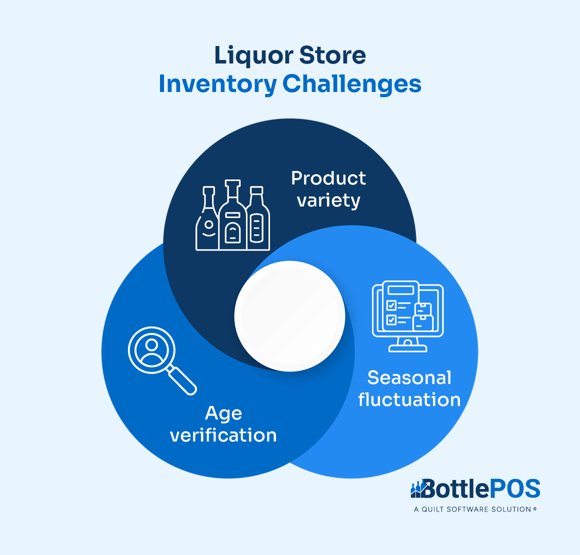
- Product variety: Liquor stores offer a wide range of alcoholic beverages, varying in size, type, and brand. This diversity makes accurate tracking and categorization more challenging, demanding meticulous organization and tracking systems to manage all items properly.
- Seasonal fluctuation: Due to holidays, events, and changing seasons, liquor stores experience extreme highs and lows in demand. Accurate inventory forecasting is essential to meeting customer needs without overburdening inventory with excessive stock that might go unused during slower periods.
- Age verification: Selling alcohol legally requires your store to reliably verify that your customers meet the legal drinking age. Your store needs real-time age verification systems to prevent accidental sales to underage customers. Integrating these systems with inventory management processes is critical to maintaining compliance and preventing potential legal repercussions.
3 Best Tools for Alcohol Inventory
1. Bottle POS
Bottle POS is a comprehensive liquor store management solution designed with automation, AI-driven insights, and essential features to enhance business decisions. Our centralized database simplifies inventory updates for liquor stores' wide range of products.
Key features:
- Automated invoicing
- Dual pricing options to encourage cash payments
- 24/7 mobile inventory management
- Case break inventory
- Advanced security features to reduce shrinkage
- Built-in customer loyalty programs
Pricing:
You can get a custom quote using our transparent Build and Price tool.

2. mPower Beverage POS
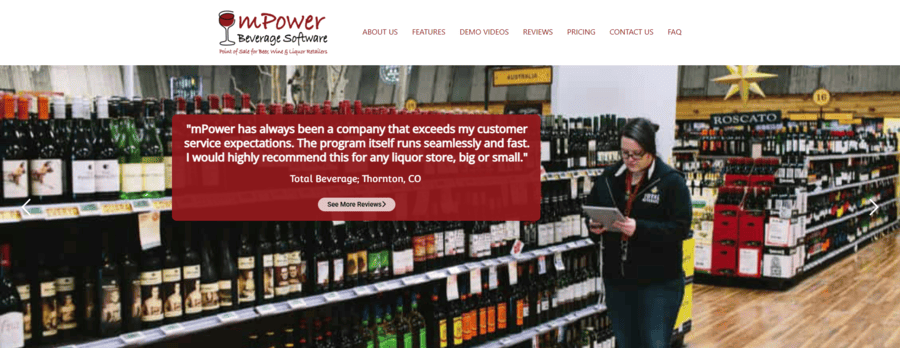
mPower Beverage POS is a point of sale and inventory solution for beer, wine, and liquor stores. It aims to help retailers make more informed business decisions and run their stores more efficiently.
Key features:
- Beverage-specific item setup
- Intelligent ordering
- Inventory tracking by location
- Case breaking
Pricing:
mPower Beverage POS costs $1000 upfront, then $120/month for one register.
3. KORONA POS
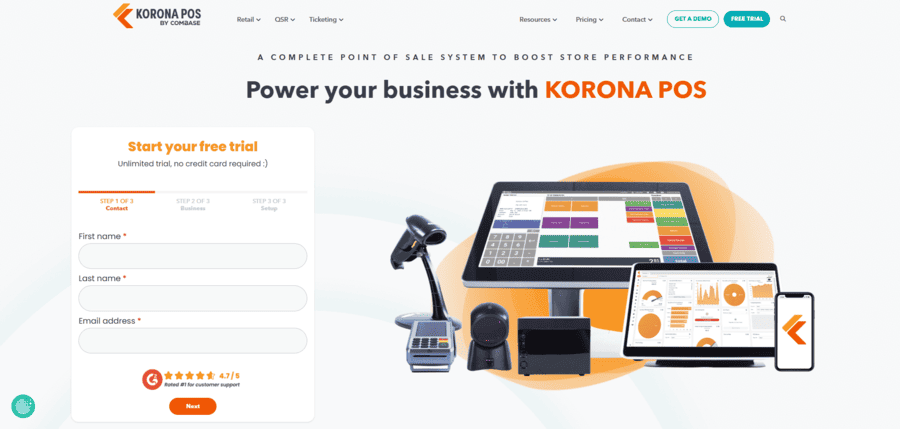
KORONA POS offers a point of sale solution that empowers you to track, monitor, and optimize your inventory seamlessly. KORONA serves a broad range of businesses and offers solutions that are a strong fit for enterprise-level clients or liquor stores with multiple locations.
Key features:
- Automated reorder levels
- Custom shelf label printing
- Multiple product codes
- Vendor shipment tracking options
Pricing:
KORONA’s most basic package starts at $59 per month.
Top 6 Tactics for Alcohol Inventory
To effectively manage alcohol inventory, you may need to explore multiple tactics. Incorporating tactics like the ones we’ll list below into your alcohol inventory management strategy can help you navigate challenges, improve operational efficiency, and ultimately provide a better experience for your customers and your bottom line.
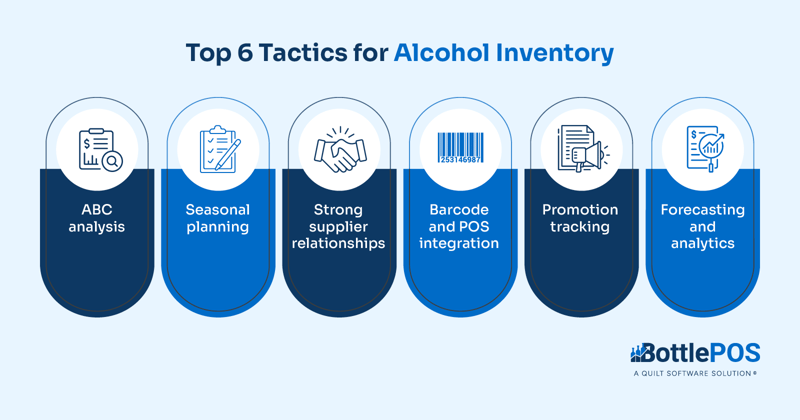
1. ABC Analysis
One effective strategy is the ABC Analysis. In this tactic, you will categorize products into multiple groups: A, B, C, D, and so forth.
Quickly identify which brands drive your sales and which are overstocked or dead stock. For example, using Bottle POS, you can auto-rank all of your items on an A-B-C-D scale and color-code them based on sale patterns.
This approach helps you prioritize your resources, applying attention and budget where you need them most, while still keeping your finger on the pulse of your inventory as a whole.
2. Seasonal Planning
Anticipating seasonal demand shifts is another smart tactic you should explore for managing alcohol inventory. Identify holidays, local events, celebrations, and other peak seasons. Identifying these fluctuations in demand can help you adjust inventory levels appropriately.
You may decide to stock up on more light beer ahead of Super Bowl Sunday, or invest in more bottles of tequila and triple sec as the summer months approach. Stocking up on popular items before the appropriate periods ensures that customer demands are met without the risk of overstocking during slower periods.

3. Strong Supplier Relationships
Maintaining strong supplier relationships is essential for successful inventory processes and store management in general.
Cultivating open lines of communication with suppliers allows you to negotiate favorable terms, share information about demand fluctuations, and even collaborate on promotions. This collaboration ensures timely and cost-effective restocking, reducing the chances of running out of popular items.
4. Barcode and POS Integration
Leveraging technology is pivotal for effective liquor store management. You’ll want to consider two pieces of technology: barcode scanners and a robust point of sale system.
Barcode scanners can simplify your inventory management processes. You can use these tools to automate tasks, track inventory quickly and more precisely than you can do manually, and reduce your inventory errors.
Integrating your barcode scanner with your POS system gives you a real-time peek into your stock levels, allowing you to make quicker, better-informed decisions regarding your inventory. Together, these technologies not only streamline operations but also contribute to improved customer experiences by ensuring that popular items are consistently available.
Bottle POS stands out as an ideal choice for liquor store owners. Designed with the unique demands of liquor retail in mind, Bottle POS offers features such as age verification, comprehensive inventory management, and customizable reporting. Our intuitive interface and seamless integration streamline operations, enhance customer service, and provide a holistic liquor store management solution!

5. Promotion Tracking
Tracking the impact of promotions and discounts is another crucial aspect of inventory management. Monitoring the success of your various marketing initiatives is essential to your inventory processes. You can study the ways your promotions impact your sales of various products, and let that data guide your stocking strategies.
Taking these steps allows you to optimize stock levels and avoid inventory imbalances due to changes in your sales patterns.
6. Forecasting and Analytics
Lastly, utilizing historical sales data and analytics tools for forecasting is a powerful technique. By analyzing past sales trends and leveraging predictive analytics, you can accurately anticipate future demand. This informed approach helps you make better inventory management decisions and balance supply and demand optimally.
5 Tips To Improve Your Alcohol Inventory Management
When it comes to effectively managing your alcohol inventory, adopting a set of practical tips can make a significant difference in your operations.
Incorporating these tips into your alcohol inventory management strategy can help you maintain accurate records, optimize stock levels, and help run your store!
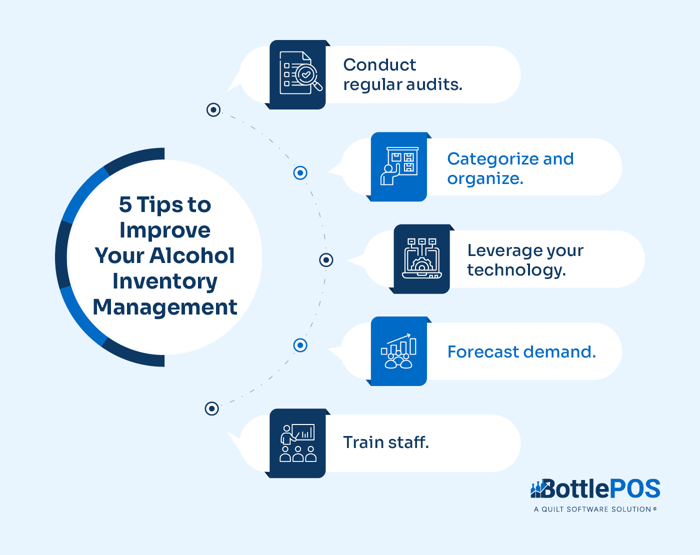
1. Conduct regular audits.
Regular inventory audits are a cornerstone of maintaining precise inventory records. Frequent checks that compare physical counts with recorded data help uncover discrepancies and ensure that your inventory aligns with what's on your books.
This proactive approach prevents potential issues and allows you to address any inaccuracies before they fester and become significant challenges for your business.
2. Categorize and organize.
Arrange your alcohol products into clear categories like liquor, wine, and beer. Take it a step further within each category by organizing based on brand, type, and size. This meticulous organization makes tracking products a breeze, whether you're restocking or monitoring sales patterns.
3. Leverage your technology.
Leveraging technology can significantly streamline your inventory management. Invest in specialized inventory management software tailored to liquor stores. These tools automate tracking, generate insightful reports, and provide real-time visibility into your stock levels. By embracing technology, you empower yourself with the tools you need to optimize your inventory.
4. Forecast demand.
As we briefly mentioned in the “tactics” section, forecasting demand is a crucial aspect of successful inventory management.
Study sales trends and analyze historical data to accurately predict future demand. You can track large-scale market shifts, seasonal changes, and more. This proactive approach helps you avoid the pitfalls of overstocking and understocking, ensuring your customers find the products they want when they want them.
5. Train staff.
Don't underestimate the importance of training your staff. Proper education on inventory practices is essential. Train your team to record sales accurately, report any damaged items, and follow established procedures for restocking.
Effective communication among your staff members ensures that everyone is on the same page, reducing the chances of errors and ensuring a well-coordinated inventory management process.
How To Do Alcohol Inventory the Easy Way
Alcohol inventory can feel like a headache — but it doesn’t have to! When you have the right systems and tools in place, your inventory management processes can hum along like a well-oiled machine.
A strong point of sale solution with robust inventory management features is essential for running your store effectively and efficiently.
Bottle POS was designed specifically for liquor store owners like you. We know the challenges you face when it comes to inventory, and we have the features that can help!
Use our case break inventory features to manage ‘build-your-own-six-packs,’ and use our barcode scanner and custom label printer integrations to scan all your inventory with just a few simple clicks!
Schedule a demo of Bottle POS today to see if our solution is the right fit for your store.
